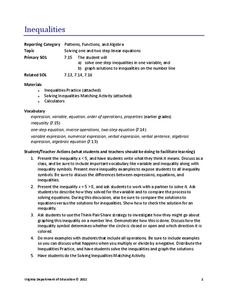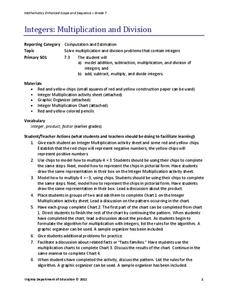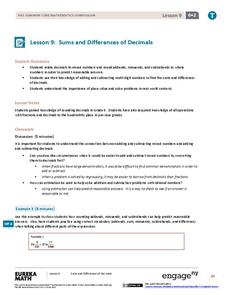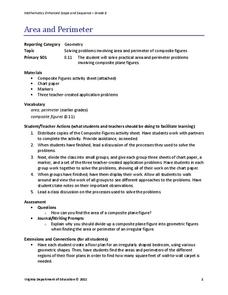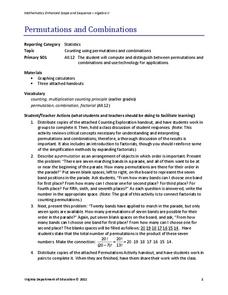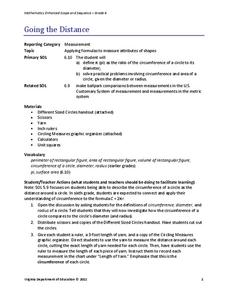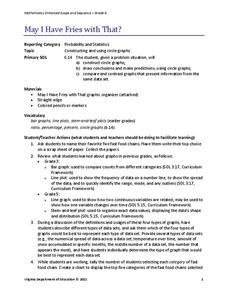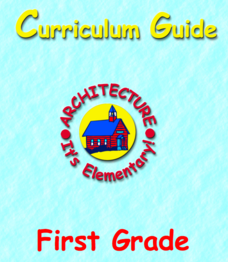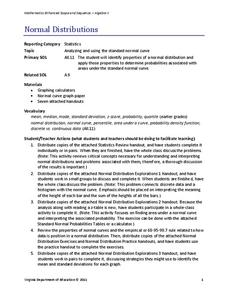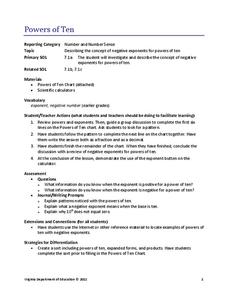Virginia Department of Education
Inequalities
Not all resources are created equal — and your class benefits! Scholars learn how to solve one-step inequalities using inverse operations. They complete an activity matching inequalities to their solutions.
Space Awareness
How To Travel On Earth Without Getting Lost
Have you ever wanted to travel the world? Take a virtual trip with a geography lesson that uses longitude and latitude, the position of the sun, an astronomy app, and a classroom globe.
Texas Education Agency (TEA)
Geometry in Architecture #1
Discover how to analyze architecture from a geometric standpoint. The fourth installment of an 11-part unit on architecture first provides a presentation on axis, balance, basic form, formal, pattern, proportion, symmetry, and tripartite...
EngageNY
Real-World Positive and Negative Numbers and Zero II
Continuing from the previous lesson plan in the series, scholars learn to use positive and negative integers to describe real-world situations. In groups, they come up with their own situations for given positive and negative...
Virginia Department of Education
Integers: Multiplication and Division
Rules are meant to be broken ... but not integer multiplication and division rules. Learners use chips to model integer multiplication and division. The results of the activity help them develop integer rules for these operations.
Virginia Department of Education
Attributes of a Rectangular Prism
A change is coming. Pupils use unit cubes to investigate how changes in the length, width, and/or height affects volume and surface area. They extend the results to write and test predictions on the effect of changing multiple sides on...
EngageNY
Sums and Differences of Decimals
Sometimes dealing with decimals is so much easier than dealing with fractions. The ninth lesson in a 21-part module has the class consider situations when it might be easier to add or subtract fractions by first converting to...
Visa
Home Sweet Home: Purchasing a Place
While the process of buying a home can certainly be overwhelming, give your young adults a leg up for their future by introducing them to the components of a mortgage, as well as exploring the basic concept of credit and how to become...
Virginia Department of Education
Properties of Operations
Explore the definitions of algebraic properties through a hands-on activity. Individuals cut and paste examples and match them to the correct properties. After examining the provided examples, pupils create examples of their own.
Virginia Department of Education
Area and Perimeter
Develop a strategy for finding the area and perimeter of irregular figures. Building on an understanding of finding area and perimeter of rectangles and triangles, learners apply the same concepts to composite figures. After...
Virginia Department of Education
Permutations and Combinations
Counting is not all it adds up to be — sometimes it involves multiplying. The lesson introduces permutations and combinations as ways of counting, depending upon whether order is important. Pupils learn about factorials and the formulas...
Virginia Department of Education
Going the Distance
Estimate the value of one of the most famous irrational numbers. The hands-on lesson instructs classmates to measure the circumference and diameters of circles using yarn. The ratio of these quantities defines pi.
Virginia Department of Education
May I Have Fries with That?
Not all pie graphs are about pies. The class conducts a survey on favorite fast food categories in a instructional activity on data representation. Pupils use the results to create a circle graph.
American Institute of Architects
Architecture: It's Elementary!—First Grade
Build an interest and appreciation for architecture in your young learners with this fun 10-lesson art unit. Engaging children in using their five senses, the class first observes the environment around them, paying...
Virginia Department of Education
Adding and Subtracting Fractions
Your learners will enjoy playing a game as a motivator to learning and remembering the adding and subtracting of fractions.
Virginia Department of Education
Rational Functions: Intercepts, Asymptotes, and Discontinuity
Discover different patterns by making connections between a rational function and its graph. An engaging lesson asks scholars to explore the behavior of different rational functions. Groups discover a connection between the function...
Virginia Department of Education
Matching Representations
Pupils explore the many representations of linear functions by completing a matching activity to connect the multiple representations of a function. They then reinforce the connection as individuals create the different representations...
Virginia Department of Education
Solving and Graphing Inequalities
You can't go wrong with a instructional activity that involves candy! Learners solve and graph one-variable inequalities and use candy to graph the solution. Individuals associate open circle graphs with life savers and closed circle...
Virginia Department of Education
Normal Distributions
Pupils work to find probabilities by using areas under the normal curve. Groups work to calculate z-scores and solve real-world problems using the empirical rule or tables.
Virginia Department of Education
Box-and-Whisker Plots
The teacher demonstrates how to use a graphing calculator to create box-and-whisker plots and identify critical points. Small groups then create their own plots and analyze them and finish by comparing different sets of data using box...
Virginia Department of Education
Powers of Ten
Investigate negative exponents of-ten. Pupils use the pattern of increasing powers of 10 to determine negative powers of 10. The scholars write the powers in expanded and product forms and make the connection to exponents using a...
Virginia Department of Education
Surface Area and Volume of a Cylinder
Surface area or volume? Pupils first review the difference between surface area and volume. They then use a two-dimensional net that helps them develop formulas for the surface area and volume of cylinders.
Virginia Department of Education
Volume of a Rectangular Prism
Fill the minds of your young mathematicians. A hands-on activity has learners fill in a rectangular prism with unit cubes to determine its volume. the exercise provides a great hands-on way for learners to connect the activity...
Virginia Department of Education
Surface Area of a Rectangular Prism
Wrap up a lesson on surface area with a resource that asks scholars to use the idea of wrapping paper to investigate surface area. They draw representations of rectangular prisms on graph paper to find the areas of the respective...


